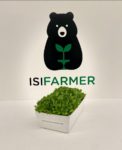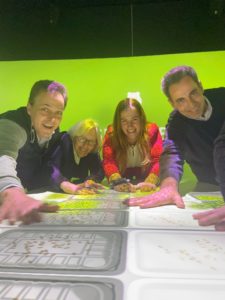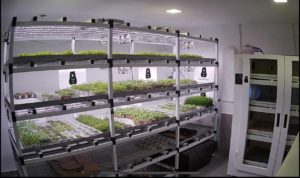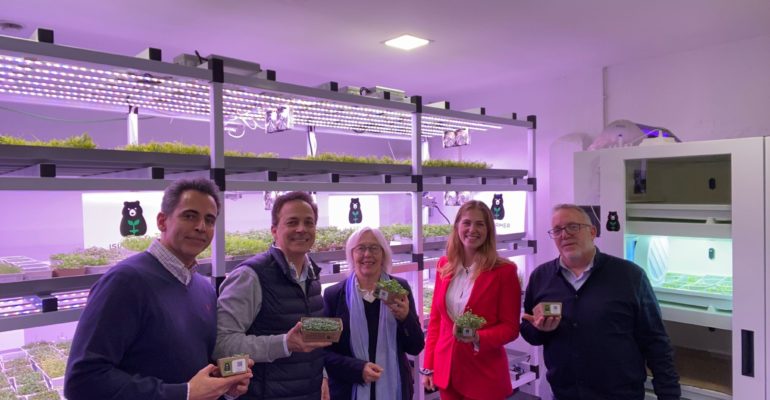Introduction
AVF is an ecological system for Vertical Farming and is organising a series of ongoing Roundtable events looking at how the threads of the vertical farming ecosystems can weave together. In February, ISIFarmer and AVF hosted the first roundtable experience looking at “Strategies for Social Impact through Urban Agriculture in Madrid. The second event was held in Vienna in March on Innovating Urban Agriculture.
The Madrid roundtable was a unique experience and the space prepared was able to foster a truly innovative and creative atmosphere. Through the collaboration of Amor al Plato Restaurant, one of ISIFARMER’s clients, and our Urban Farmers, participants were able to indulge in a comprehensive gastronomic experience featuring dishes crafted from vegetables cultivated in the same warehouse. This culinary experience grounded the discussion and enriched the discussions allowing a deeper context to the topics addressed during the meeting.
Who is ISIFarmer?
 ISIFamer’s mission is, “To Empower the Urban Farmers & City Stakeholders for locally grown, cleaner, tastier, nutritious produce”.
ISIFamer’s mission is, “To Empower the Urban Farmers & City Stakeholders for locally grown, cleaner, tastier, nutritious produce”.
“The idea is to build a global network of Urban Farmers, that are closer to our communities and kinder to our environment, where we grow a diverse range of top-quality healthy produce under any weather condition, all year round, starting right here in Madrid”.
Diverse Participation for a Holistic View
Vertical Farming represents a convergence of diverse disciplines. By fostering dialogue and collaboration among experts and stakeholders, we can harness the collective wisdom needed to identify and overcome challenges and to promote and advance VF in urban areas.
The event brought together a diverse group of stakeholders from academia, social economy, inclusion of disadvantaged groups, entrepreneurship, and the Horeca sectors to discuss urban agriculture. The discussion was a rich tapestry of ideas and knowledge exchange, showcasing the need for collaboration to bring strategies for social impact through urban agriculture.
The objectives for the Madrid Roundtable, all of which help to bridge the gaps between stakeholders, were to:
- Engage in discussions surrounding the challenges faced by society in implementing diverse formulas and strategies to achieve positive social impact through “Micro-Urban Agriculture.”
- Explore strategies for fostering positive social impact through urban agriculture,
- Promote initiatives aimed at fostering inclusive practices within this burgeoning sector.
- Explore novel models of collaborative economies to ensure the sustainability and environmental friendliness of these ventures.
- Advance local development and community resilience through urban agriculture.
So who was at the roundtable?
Luisa Alli, a distinguished public speaker and the current Secretary General of The Hermes Institute Foundation facilitated the conversation.
ISIFarmer Marcos Enriquez (Chief Farmer) and Angel Leo-Revilla (Agtech Operations).
AVF, Christine Zimmermann (Chair) – AVF believes in connecting local networks globally and through this connection fostering a better climate for vertical farming and create opportunities and networking and exchange knowledge and put this topic on the map globally.
Ekonoke, Ines Sagrario (CEO)- a pioneering farming sustainable, risk free and climate resilient hops. We combine new scientific knowledge and advanced technologies to guarantee hops’ quality and quantity. We are a state-of-the-art Agbiotech company.
Espacio Geranimos Erika Meyer – a coworking space – Erasmus + and a center specialized in entrepreneurship and social innovation.
Down Madrid Elena Escalona, (General Director) The mission of Down Madrid is the defense of the right to life and dignity of people with Down syndrome or other intellectual disabilities, as well as their full family, school, work and social inclusion and the improvement of their quality of life from their birth until aging.
Politechnica de Valencia Gabriel Garcia Martinez (Professor School of Agronomic and Natural Environment Engineering), passionate about integrating the university into the society and making an impact.
Kitchen of Spain Diego Guerrero (General Director) has won two Michelin stars. He is passionate about connecting farmers to the end consumers. It is not just a plate you are eating, it adds to the gastronomic experience to know where the food came from.
Inserta Empleo Madrid Carmen Montez (Regional Director) working with people with disabilities, using an innovative approach to developing talent and promoting equal opportunities and inclusiveness in projects and at work.
Themes and Takeaways
- A shift in mindset is required from where food was separated and produced by farmers to one where it is grown in hi-tech environments by farmers in cities and urban areas.
- New economies need to emerge, and we have to understand that just producing more only with profit is not the only way of moving forward. Social impact such as that seen in ISIFarmer is a better example of a way to move forward.
- Awareness raising of what vertical farming is and the
 benefits of vertical farming – for people to adopt the positive benefits and advantages of the idea – co-working spaces went through a similar process before being adopted more widely. Applying to become Erasmus + projects and these social projects in Madrid can help explain these projects and then they can ripple out through wider society.
benefits of vertical farming – for people to adopt the positive benefits and advantages of the idea – co-working spaces went through a similar process before being adopted more widely. Applying to become Erasmus + projects and these social projects in Madrid can help explain these projects and then they can ripple out through wider society. - Vertical farming is a beacon of development that will be part of the future and can be part of many different economies because it has many different types of jobs allowing for inclusiveness, ‘silver’ economy etc to be within it – it can incorporate fluid business models.
- Vertical farming is an example of decentralization by creating [food] communities in local areas within mega-cities.
- Vertical farming needs to be on the political agenda as a way to feed people while the ongoing climate change effects unfold around us. Investment is required now to help create a resilient food system in the future.
- Marketing Campaigns for vf businesses and consumers. Will consumers ‘buy into’ the benefits of vertical farming – and if so how do run marketing campaigns around this?
- Sustainability trademarks, AVF offers Sustainable Indoor Farming Certification.
- Could we realise a virtuous marketing circle of support and marketing between vertical farming businesses, restaurants, other purchasing outlets and organisations working together on these community projects for branding on for example, ‘Local Healthy Food’.
- Many of the tasks in vertical farming require the right skill set precision (e.g. sowing) and great focus, so matching an individual well to a suitable task takes skill.for a person to be able to tend to the process well.
- Important that vertical farmers are not seen as being on a mission to eliminate traditional farming, vf is an additional way to grow food alongside the already existing agricultural system as a second or third level producer.
- For people wanting to become vertical farmers combining micro-operations in a hub can help lower the entry costs.
- There are many people with different roles within the food system who need to be ‘heard’ and this approach can weave social impacts together.
- Will consumers ever shift from wanting food products to ‘always’ be in season to accepting a more natural ‘seasonal’ approach to food availability? And what role does vf have to play in this as you could grow crops all year round, which is one benefit of vertical farming s is producing local food for local consumers on demand.
- We can substantially reduce food waste with Vertical Farming by producing more customized (smaller) sizes of portions eaten by customers.
Looking Forward
The AVF is dedicated to facilitating discussions and collaborations in this area, so if you have a project you would like to discuss or would like us to run a roundtable on these themes, please get in touch.
Next Steps – Join the Movement
The AVF invites those interested in urban agriculture, food resilience, and VF to join broader system change in urban areas. Businesses, policymakers, urban planners, and individuals all have experiences, resources, and stories to contribute to this movement’s fabric.
Contact Us
Please contact the AVF to learn more, explore partnership opportunities and stay connected with the AVF and our network of urban agriculture innovators.




Comments are closed.